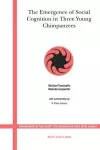
The Emergence of Social Cognition in Three Young Chimpanzees
2 authors - Paperback
£38.95
Michael Tomasello (Ph.D., 1980, Psychology, University of Georgia) taught
at Emory University and worked at Yerkes Primate Center from 1980 to
1998. Since 1998, he is Co-Director at the Max Planck Institute for Evolutionary
Anthropology, Leipzig, Germany. Research interests focus on
processes of social cognition, social learning, and communication and language
in human children and great apes. Books include Primate Cognition
(w/J. Call, Oxford University Press, 1997), The Cultural Origins of Human
Cognition (Harvard University Press, 1999), and Constructing a Language: A
Usage-Based Theory of Language Acquisition (Harvard University Press, 2003).
Malinda Carpenter (Ph.D., 1995, Psychology, Emory University) currently
is a member of the scientific staff of the Department of Developmental and
Comparative Psychology at the Max Planck Institute for Evolutionary Anthropology.
Her research interests include imitation and other types of
social learning, infants’ understanding of intentions and other mental states,
and joint attention and other early social-cognitive skills. She has worked
with typically developing infants and young children, young children with
autism, and apes.
R. Peter Hobson (Ph.D., 1989, FRCPsych, CPsychol) is Tavistock Professor
of Developmental Psychopathology in the University of London. He is an
experimental psychologist and psychiatrist (and psychoanalyst), trained at
Cambridge University and the Maudsley Hospital, London, and now at the
Tavistock Clinic, London and the Institute of Child Health, University College,
London. His primary research interest is the contribution of social
relations to early cognitive as well as social development. His principal fields
of study are early childhood autism, congenital blindness, mother–infant
relations, and adult borderline personality disorder. His first book was
entitled Autism and the development of mind (Erlbaum, 1993), and his second
more accessible and wide-ranging book is called The Cradle of Thought
(Oxford University Press, 2004).